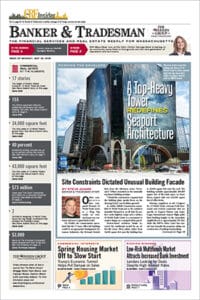Vikas Enti
Co-Founder and CEO, Reframe Systems
Age: 38
Industry experience: 17 years
As a growing number of Massachusetts communities permit construction of small infill housing models, a venture capital-backed Andover startup is seeking to apply robotics technology to residential construction. Founded in October 2022 by three former Amazon Robotics employees, Reframe Systems is seeking to industrialize production of compact housing types such as accessory dwelling units and triple-deckers.
The company’s first ADU prototype was completed this month at 40 Dorothy Road for Housing Corp. of Arlington, following the town’s legalization of accessory dwelling units up to 900 square feet in 2021. Beyond backyard dwellings, Reframe Systems has designed various small-format housing prototypes for construction at its existing Andover plant, where robots augment employees’ labor in framing, sheeting and drywalling. The plant currently has production capacity for 50 dwellings per year and Reframe Systems is in early planning for a second facility to serve the Western Massachusetts and southern New Hampshire markets.
Q: What was your business plan in co-founding Reframe Systems?
A: Climate change was top of mind and having deployed robots around the world, I figured I had some skills for new industries that I could apply to reduce carbon emissions. That brought me to construction and the built environment. We already had the recipe for Passive House high-performance dwellings. The cost of solar has gone down, and the cost of heat pumps has come down, but the cost of building homes has doubled. That problem statement led to the formation of Reframe Systems. You have to truly industrialize construction to drive the savings we need. There are ways we can make the cost of construction more efficient. We built a thesis about this that suggest there are ways we can make the cost of construction more efficient.
We built the thesis around low-cost robotics we built proprietarily, where we augment the existing trades. We changed the nature of construction drawings from where you need years of training to read them, and taken inspiration from IKEA and Lego to provide visual implementation and it’s easily understood. One thing different is we see ourselves as a product company. We are treating homes as products. We are not a design-build contractor. We are a product company delivering a turnkey experience.
Q: How does the citywide legalization of triple-deckers in Somerville this spring provide an opportunity?
A: We have two triple-deckers in contract: one for Somerville Community Corp. at 31-33 Cross St. East which will include income-restricted units and one for an owner-occupied property at 13-17 Gilman St.
Q: Gov. Maura Healey is proposing legalization of ADUs up to 900 square feet on a statewide basis. What are the other barriers to the growth of this housing model?
A: Lexington, Winchester, Salem, Somerville, Newton and all of Barnstable County have all legalized ADUs and there are many other pockets around the state. We would like them to converge not just on maximum dimensions, but on maximum height. Every town has different rules.
Q: Are there limitations related to requirements for union labor in some communities?
A: We haven’t run across that yet. The scale of the projects we are working on are small. We are open to having conversations with the unions when the time comes. Our trades are making a minimum of $33 an hour plus benefits, so we believe we have a healthy setup.

Reframe Systems’ 900-square-foot accessory dwelling unit includes all-electric heat pumps and Passive House building techniques. Image courtesy of Reframe Systems
Q: How big is the Andover facility and potential production capacity?
A: The facility is 16,800 square feet and we have seven full-time builders on staff including a supervisor. As a company, we’re 25 people including the software and engineering teams, an architect and structural engineers. We started at Greentown Labs in Somerville and now we are co-located at the Andover site in construction trailers, and waiting for own offices to be completed inside. We are capable of completing 900 to 1,000 square feet per week, roughly the size of the Cottage House in Arlington, so roughly 50 of those per year. We are projecting 30,000 square feet of production capacity for 2025.
Q: What are the retail prices for the units?
A: There is a range of $300,000 to $350,000 for an ADU that is between 900 and 1,000 square feet, depending upon the community. As we go larger, our costs scale to $275 to $300 per square foot for a net zero high-performance Passive House.
Q: How much cost savings does the Reframe Systems model achieve over a conventional modular project?
A: We project about 30 percent. We have a five-person team that builds the ADU, compared with maybe an eight-person team that would build it over the same amount of time. The other cost savings is procuring the equipment ourselves. For example, we were quoted $30,000 from a subcontractor to deploy solar and battery storage, and we were able to procure the equipment ourselves for $20,000.
Enti’s Five Favorite Quests:
- Best Croissant – Collette Bakery, Medford
- Best night sky – Silver Lake, New Hampshire
- Best bread pudding – still searching
- Best bike trail to ride w/kids – Shining Sea Bikeway, Cape Cod
- Best unexpected restaurant: Baldwin Bar/Sichuan Garden, Woburn







